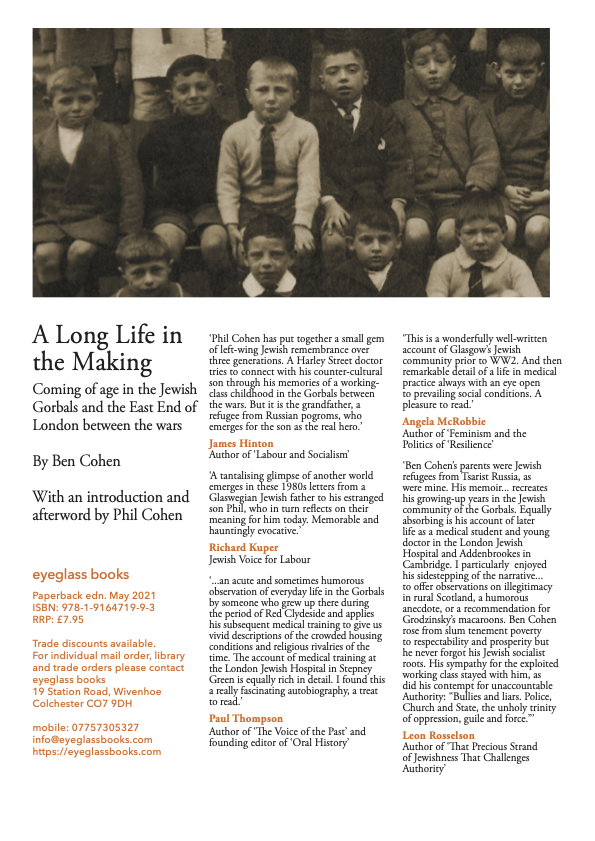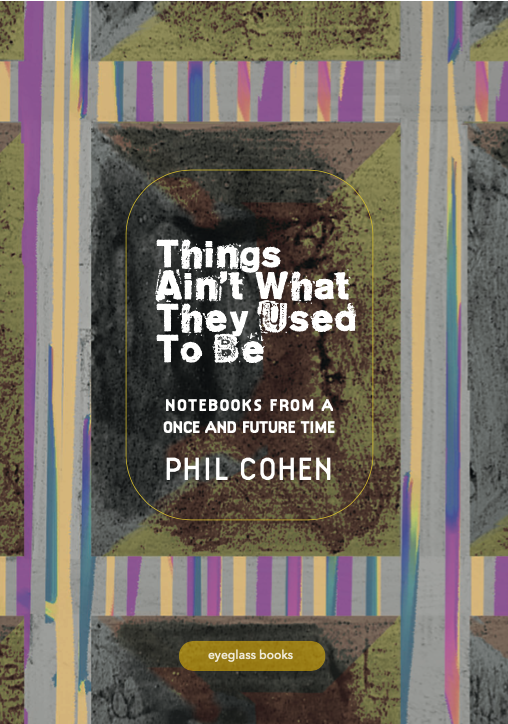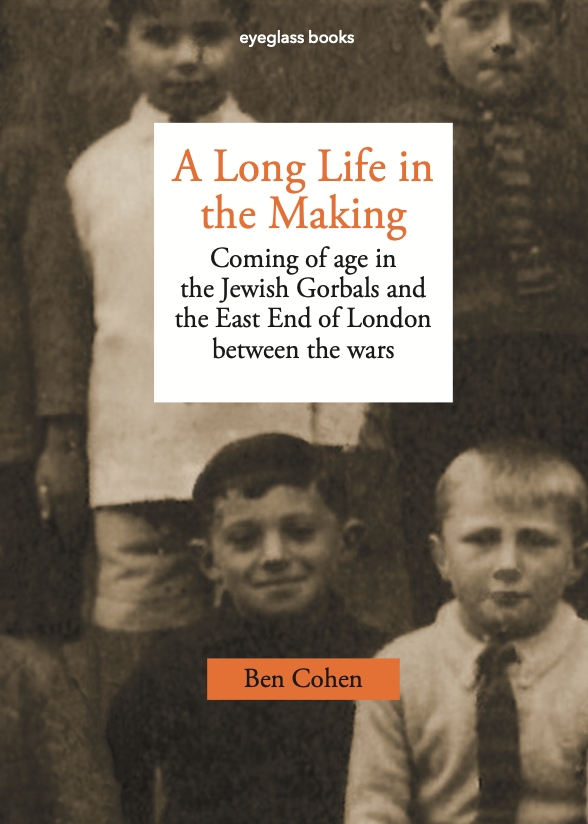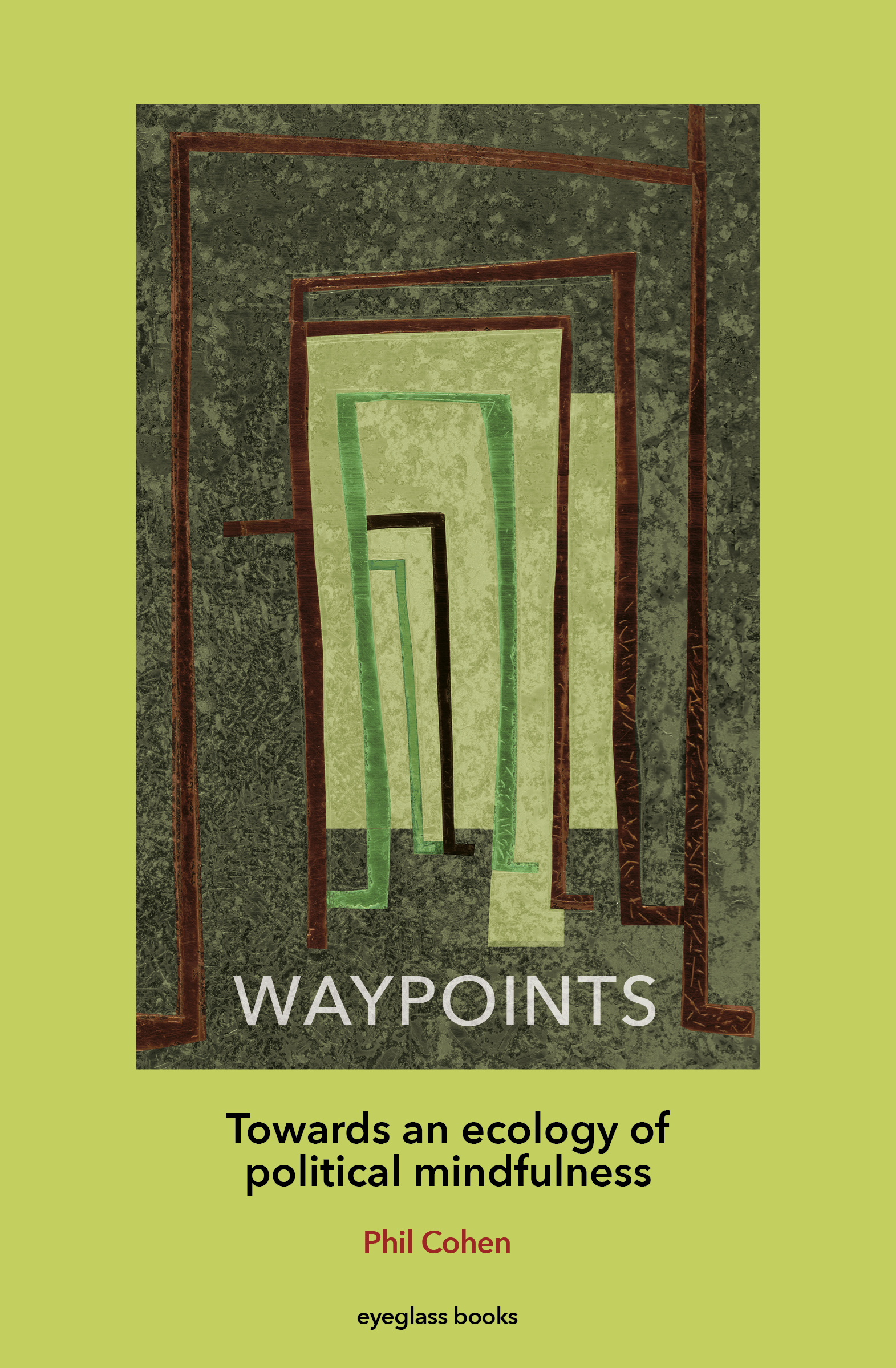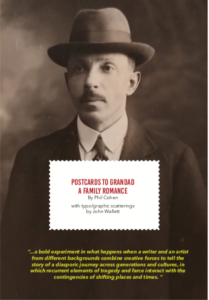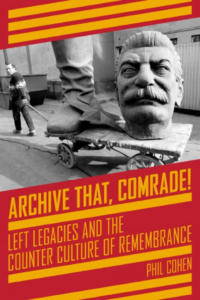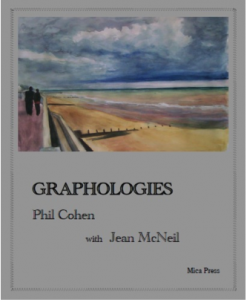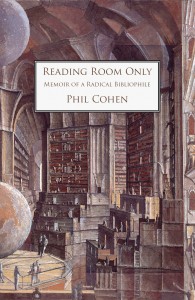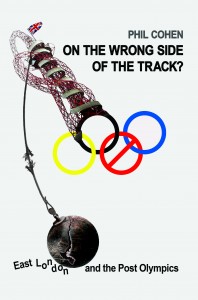Phil’s has created a Vimeo video of the book with selected readings.
This is an afterword to my father’s memoir which I have just edited for forthcoming publication by eyeglass books.
I thought that the reader might be interested to know a bit more about the biographical background to this memoir, what motivated and influenced my father to write it, its relation to other books about life in the Gorbals, and finally what was at stake for me personally in editing the text.
My father was extremely well read, an influence from his early years growing up in a Jewish working-class culture which venerated book learning and those who had it, another family tradition passed on to me.[1] His main interest in his retirement was compiling a series of self-published bibliographies about major rivers. He did the Thames, The Clyde and the Delaware[2], and this hobby united his interest in boating, he kept a cabin cruiser on the Thames at Henley for many years and books, he was a keen collector of rare, mainly topographical, antiquarian literature. His research often took him to the British Library, just down the road from where he lived in Bloomsbury and occasionally I would see him in one of the reading rooms, immersed in a pile of ancient volumes and with an invisible sign on his desk: danger scholar at work, please do not disturb! He also wrote a series of articles about the history of surgery which he published in various medical journals and some short biographical sketches of doctors he had worked under, fortunately most of them deceased, as the accounts were often scurrilous, if not actionable!.[3] He was proud of these literary accomplishments and he never tired of telling me how much money he had made from his books, much to my chagrin.
My father also wrote this memoir which he gave to me as a kind of legacy shortly before he died. It look the form of a series of long ‘letters’ to me, and was written over a number of years in the late 1980’s during a time when our relationship was more than usually strained, and we were scarcely on speaking terms. It was a way, then, for him to reaching out to a ‘prodigal son’ , although I think perhaps its main motive was to give himself a vantage point from which he could review his life and set it in some kind of social and historical context. It is also worth noting that he wrote the bulk of the memoir shortly after his life long partner, (and my mother), died after a long illness and he was spending a lot of time on his own. There are quite a few references to ‘Myrtle’ scattered through the text, and there is no doubt that writing the memoir was partly a way of remembering her and mourning her loss.
In introducing the text and his reason for writing it, my father cites, as a literary precedent, the famous epistolary memoir by the Earl of Chesterfield written to his natural son , although this latter book is less a memoir than a discourse on manners and morals designed to instruct a young aristocrat in the ways of the world. [4] My father had a rather different ambition: to help us both understand more about the forces that had shaped him into the kind of person he was; in that limited sense it is a classic apologia por sua vita, not just a description of the environment which formed him, but an implicit explanation of its influence on his subsequent life .
It was also, more explicitly, an attempt to satisfy my curiosity about what life was like in the pre-war period. Growing up, as I did, in the immediate aftermath of war, when the war itself was featured on screen as a boys own adventure story told by and for grown-ups, what happened before remained shrouded in mystery. So I was keen to hear him talking about such events as the General Strike, the Spanish Civil War, and Red Clydeside.
Perhaps also at the back of my father’s mind in embarking on this venture was a book he had on his shelves by Edmund Gosse. Father and Son, a study of two temperaments. The book is about the gulf between not just two temperaments, but two cultures and two generations, the author’s own, that of an Edwardian aesthete who rejected the influence of the ‘eminent Victorians’ and his father’s, a Plymouth Brethren and marine biologist, who nevertheless rejected Darwin’s theory of evolution as blasphemous.
In our case I belonged to a generation which rejected my father’s version of labour movement politics, in favour of 1960’s radical counter-culture whose politics were focussed around personal issues of gender, sexuality and the environment. So perhaps my father’s memoir could be a read as a reversal of the Gosse project, in which a man of science and a strict materialist tries to show his wayward drop-out son whose head was filled with utopian dreams just what he was turning his back on.
My father was a materialist in several senses of the word. Philosophical: he grew up under the influence of his father’s Marxist world view. Professional : as a medical man he was committed to a biological model of illness and did not have much interest in human psychology, and even less time for those whom he used to refer to disparagingly as ‘trickcyclists’. Nevertheless he would, I think, have been impressed by recent advances in neuro-science. He was a great fan of the work of the late Oliver Sacks whose family he knew and with whom he shared the experience of suffering under the hand of sadistic school masters as well as an interest in colour blindness, a condition from which my father suffered from birth. [5]
Finally, like many people who endure privation in their childhood, he took pride and pleasure in the material possessions he acquired, these were signs not just of financial but ontological security, and the two were somewhat conflated in his mind. He liked to give me a guided tour of the old clocks he collected, each of which had a name, and a will of its own, and in addition to airing his considerable knowledge about their provenance, he could not resist telling me how little he had paid for an item and how much it would now fetch at auction. He was not acquisitive in the sense of wanting to accumulate more and more stuff, but he was parsimonious, thrift being another symptomatic effect of having grown up poor with all its attendant insecurities. As a result he was capable of acts of great generosity, but also on occasion, could display a certain meanness of spirit.
The Scholarship Boy
Some people might be inclined to read my father’s memoir as a typical rags to (relative) riches story, poor Jewish boy from the Gorbals becomes Harley Street doctor driving a Rolls Royce. We have become used to the social ambivalences of ‘scholarship boys’ who no longer feel they belong within working class culture, but do not fit in or feel comfortable within the middle class milieu they now inhabit. They may sometimes be ashamed of their ‘humble’ origins, and try to conceal them, but more often than not they are as proud of their roots as of the routes they have taken beyond them. My father was the only member of his family to go to university, his two brothers and sister were not ‘scholars’ , instead making their way successfully in business, as did many of their peers. Sociologists have talked a lot about ‘embourgeoisement’, by which they mean the assumption of middle class values and life styles by people who grew up working class. They also like to distinguish between ‘sponsored’ mobility, that is institutionally engineered forms of social advancement , and ‘ contest’ mobility, people bettering themselves through their own individual enterprise and initiative.
In many life histories such neat pigeon holes simply do not fit the intimate entanglement of personal and structural factors, nor the complicated negotiations that take place between past, present and future selves. Certainly in my father’s case, he did not sentimentalise life in the Gorbals, he recognised that poverty stunts people’s personal growth in many ways, but he also recognised and valued the social and cultural richness that was to be found in the Jewish family and its community.
As a Grammar school boy he may have been shielded from some of the rougher aspects of life in the Gorbals. There are no lurid descriptions of razor gangs or street fights as are to be found in some famous accounts of the area. Then again his early apprenticeship into a radical political culture gave him a different perspective on local life. He never lost what he referred to as his ‘bolshiness’ , standing up for yourself and your kind against Authority, which he learnt in the Gorbals.
This rebel stance came out in a number of ways. He had a life long antipathy to the police, sprung from his early brushes with what the Gorbal’s community regarded as an occupying force. Later on he identified with the Black communities experience in this regard, although like many of his generation he found it hard to adapt to the multi-racial character of post Imperial Britain. At the same time, he remained suspicious of the Establishment, both political and medical, and, for example, fiercely defended patients’ rights when he though they were being ignored. He was one of the first surgeons to insist that parents had the right to be at their children’s bedside when they came round after an operation, if necessary staying in hospital overnight. Politically he remained on the Left, and had no time for ‘New Labour’. Yet he made a small fortune successfully playing the stock market , investing his retirement nest egg in a series of shrewd speculative ventures, pulling out just before the financial crash of 2008 .
His tastes, from the collecting and consumption of fine wines and whiskeys to his penchant for expensive cars were those which typify the self made professional man, yet he did not go in for conspicuous displays of wealth. .Perhaps his conflicted attitude could best be summed up by his reply when I asked him what it felt like to own and drive a Rolls Royce:
‘Och its not what you think . Its no big deal. I really got it for your mother, she likes to ride in it. I don’t care what other people think . Anyway, nowadays, the Roller is a working man’s car. Even the Beatles have got one’.
No Mean City? The Gorbals in Fact and Fiction
Like the East End of London, the Gorbals, in the East End of Glasgow, has attracted a large literature documenting its culture, values and patterns of everyday life. Much of this belongs to a special genre of ‘slum writing’, which nowadays is subsumed under the general rubric of ‘poverty porn’ and which provides graphic descriptions of social deprivation, violence and ill health, sometimes tempered by individual acts of kindness generosity, courage and resilience. Whether overtly fictional, or written in the idiom of pop sociology, these books claim to offer their readers the inside story of what life is like ‘on the other side of the tracks’. They often deliberately aim to shock middle class sensibilities by showing people being crushed by the material circumstances of their lives, destroying themselves and each other through the influence of drink and more recently drugs. Precocious and promiscuous sexuality laced with domestic violence and child abuse often provides a melodramatic backdrop to tales of personal redemption and triumph over adversity. This is especially the case in memoirs written by ex- ‘inmates’ who have made it into the middle class. The devices of literary realism , including generous helpings of vernacular speech, are often used to invest the narrative with authenticity, whilst invoking a special kind of response in the reader: a voyeurism that is socially committed to its object.
In the case of the Gorbals much of this writing is focused on its long established gang cultures. The trend began with No Mean City[6], perhaps the most famous, or notorious, account ever produced about the area , written by a journalist and local collaborator and published in 1935 to widespread acclaim. The story follows the exploits of one Jonnie Stark, the self styled king of Glasgow’s razor gangs, as he grows up embattled with a violently abusive father and finds a second family amongst his ‘brithers’ in the streets and closes of the Gorbal’s decaying tenements. The story ends all too predictably with his premature death at the hands of a rival gang.
The ‘penny dreadful’ narrative is interspersed with observations which combine moralism with pseudo –sociological comments. The following quote from the beginning of a chapter entitled ‘The Like of Them’ gives some of the flavour:
“An understanding and reasoned contempt for one’s neighbours, combined with a fiercely unreasoning conviction of one’s superiority is not an uncommon phenomenon of the slum mind. Habit and custom may blind a man to the squalor of his home, but they may not prevent him from sniffing disdainfully a friends ‘hoose’, no more sordid, dirty and overcrowded as his own. Perhaps there is, all the time, subconsciously a rebellion against conditions which are outwardly taken for granted. Many a tenement dweller ,particularly before the years have withered his hopes, like to think , and perhaps believes , that he has something in him, some special gift in mind and body, which makes him different from his fellows. He is always hoping, like Micawber, that something will turn up.In face of all evidence to the contrary, he is still confidant that the day will come when his superiority will be recognised”.
The authors are interested in finding out what makes this culture and the people in it tick, but their attempts at a ‘mass psychology’ of slum life are crude.[7]
No Mean City has had many imitators. In the immediate post- war period, the area continued to receive a bad press , but in the 1960’s and 70’s it came under attack from town planners and was extensively ‘regenerated’; this resulted in the demolition of many of the old tenements and the dispersal of its increasingly diverse population to other parts of the city. In particular, many Gorbal’s folk were relocated to the sprawling housing development of Easterhouse on the outskirts of the city and this in turn became the focus of moral panics about drunkenness, domestic violence and gangs. Almost overnight the Gorbals became an object of nostalgia, and accounts of the ‘auld place’ began to appear which celebrated its close knit community spirit, its resilience and humour in the face of adversity and the rich cast of’ ‘characters’ which made everyday life so eventful and hence narratable.
Colin MacFarlane’s The Real Gorbals Story[8] subtitled ‘True Tales from Glasgow’s Meanest Streets’ is perhaps the most honest, or rather disingenuous exercise in this vein. The author describes growing up in the area from the 1950’s until the 1970’s and although anxious to stress the continuities with the pre-war culture described by McCarthur and Kingsley Long, he manages to conjure up a rosier picture, as if somehow the people had mellowed along with the place. This sentimental rehabilitation of the old Gorbals was an indirect response to the actual gentrification of the area ;it made the place culturally inhabitable for the new middle class residents , many of them young professionals who liked to feel that they were living in place with an exotically ‘dangerous’ reputation provided they did not actually find themselves the targets of street crime.
Then in 1973 came the publication of Glasgow Gangs Observed [9] , written under a pseudonym by a teacher at a local approved school who, with the connivance of one of its ex-inmates, joined one of Glasgow’s more prominent gangs as an undercover observer. Although the author was not an anthropologist by training , and despite the dubious nature of his research project – no university ethics committee would sanction such an operation today –‘ ‘James Patrick’ does rehearse most of the tricks of the ethnographers trade; he succeeds in building a convincing picture of street gang culture, focussing on its roots in religious sectarianism and chronic deprivation , as well as its links with organised crime and territorial prides of place. The study is focussed on Maryhill , an area adjacent to the old Gorbals where many had been decanted , and indeed his story is very much a case of old wine in new bottles. The more dramatic observations in the book were excerpted and given sensationalised coverage in the national press; the author’s cover was blown, he received death threats and as one of the locals put it ‘ he had to do a runner,if he didna want his heid bashed in’ . For perhaps the first and last time Glasgow’s political class and criminal class, respectable burghers and the denizens of the city’s ‘lowlife’ joined forces to condemn a book which threatened their respective business interests.
The generic problem with this slum literature lies in its split standpoint, at once moral and epistemological . These are either ‘insider’ stories written by people who made it out of the ‘ghetto’ or accounts by outsiders who use various devices to ‘pass’ for insiders . Before the advent of oral history projects in the 1980’s there was no platform in which the memoryscapes of working class life and labour could be directly captured and communicated in situ , to and by local people themselves, with the minimum of mediation by outsiders[10] .
However in the 1980’s an altogether more nuanced account of working class culture and community began to emerge from a new generation of Scottish writers and painters , who had themselves grown up on the ‘wrong’ side of the tracks , but were determined to neither romanticise or sensationalise a way of life that was being destroyed by Thatcherism and the de-industrialisation of Glasgow’s economy. James Kelman’s novel How Late it was,how late shocked the literary establishment when it won the Booker prize in 1994 , but the raw lyricism of its vernacular idiom drew upon a long tradition in Scottish literature going back to Burns, and dedicated to exploring the cadences of a ‘poetry made by all’. As he put it in his acceptance speech:
‘As I see it, my book is an argument based solely on behalf of validity, that my culture and my language have the right to exist, and no one has the authority to dismiss that right, they may have power to dismiss that right, but the authority lies in the power and I demand the right to resist it.’
Similarly the artists who were dubbed ‘New Glasgow Boys’, led by Peter Howson and Ken Currie . The group emerged to prominence in the 1980’s with bold expressionist figurative painting depicting scenes of everyday working class life in the city. The name itself still harks back to a school of post –impressionist and social realist painting with its roots in the Glasgow School of Art a century earlier[11].
Perhaps the most interesting account of growing up in the Gorbals and the formative influence of those early experiences on subsequent life story making is to be found in the trilogy of books written by Ralph Glasser[12]. His work also happens to be the closest to my father’s memoir in terms of its mise-en-scene. Glasser was born in 1916, a year after my dad, grew up in the same street (Warwick Street) and attended the same elementary school ( Abbotsford). The similarities do not end there. Glasser’s family were also Jewish immigrants from Russia , although not from the same area; both Ralph and his father were regular attenders at the Jewish Worker’s Centre that my grandfather helped establish and my dad also visited. It is highly likely then that members of the two families were acquainted, if not actual friends , although I never heard my father mention the Glassers by name. He certainly had not read any of Ralph’s books.If he had done so he would undoubtedly have recognised many of the features of tenement life that Glasser describes in such meticulous detail. He might have somewhat grudgingly admitted that the account of pub life, and the ‘menodge’ men ( enforcers who put the frighteners on tenants who borrowed money to buy necessities but then found they could not keep up the weekly payments) added a dimension lacking in his own rather more circumscribed story
However I do not think that he would have appreciated Glasser’s occasionally hyperbolic style of writing , his tendency to pause the action to psychologise or philosophise at the drop of a ‘bunnet’, and his penchant for quasi-Dickensian characters and scenes .
From these common Gorbals roots , the two authors followed rather different routes out. Ralph left school at 14 to take a job as a soap boy at a local barbers, then worked in a garment factory, while studying at night school, until finally getting a scholarship to Oxford, and famously cycling all the way there from Glasgow. A story then of contest mobility until higher education kicks in . He subsequently became a well known psychologist and environmentalist, and one way of reading the trilogy is as a prolonged meditation on how the material and social environment shapes- and often warps – individual personality.
These different trajectories account for divergent perspectives especially in relation to politics. As boys, both Ralph and Ben were immersed in the radical political culture of the Jewish community, and also influenced by the Scottish Labour movement in which the anarcho-syndicalist ideas of Daniel De Leon had great currency. John McClean figures prominently in both accounts . This tradition of working class militancy survived two world wars but not the death of heavy industry under Mrs Thatcher. The shop stewards occupation of the Upper Clyde shipyards led by Jimmy Reid in 1971 was its famous last stand[13]. My father remained loyal to this tradition , or at least the Left Labourism of the ILP, leading to fierce arguments around the family dinner table with my mother who was an ardent Thatcherite, providing me with an early political education[14]. Ralph however was much more ambivalent about local Left politics. One of the central narrative threads running through his memoir is his ongoing debate with his best pal ,Norman. who is an ardent Young Communist and devotes all his energy and passion to the Great Cause of the Worker’s Revolution. In effect ‘Norman’ becomes a foil for Glasser’s repudiation of working class politics, and his assertion of the importance of the individual over and against the collective. There is a certain relish in the account of Norman’s mellowing , as he become a reformist trade union official , moving out of the Gorbals into a much posher neighbourhood.
In my father’s case he succeeded in preserving his early allegiances intact, albeit at the price of splitting them off from his life as a successful professional and business man. In the cadences of his writing , which is much closer to oral testimony than written prose, you can still hear the brusque lilt of the Gorbal’s speech community. He may have lost his Glaswegian accent , but not its inflections of how to speak your mind.
The Text as Legacy
The dossier my father handed over to me consisted of over a hundred pages of typewritten text, with a few handwritten corrections in the margins. It is organised as a series of letters to me; although these are not dated, it is clear that they were written at considerable intervals. In some cases there is a reference to having re-read an earlier ‘letter’; but elsewhere there is some repetition, indicating that my father had forgotten that he had already committed an event to paper.
The memoir ends rather abruptly, after he has described some halcyon days as a young doctor at Addenbrookes hospital in Cambridge. Perhaps he wanted to end on a happy ,up beat note, knowing in retrospect that the storm clouds were gathering in Europe and war was not far away. Here for an all too brief moment his early struggles could be put behind him and the fruits of his endeavours enjoyed.
But perhaps there was another more hidden message contained in this premature ending. This was a letter addressed to a son who had won a scholarship to Cambridge, fulfilling a long held parental ambition.. Yet this same son had rejected the dreaming spires, thrown it all up and run away to join the Beatniks, apparently bringing to a premature conclusion an otherwise promising academic career. Perhaps in showing me how much he had enjoyed his Cambridge days, my father was not only signalling how disappointed he was at my failing to follow in his footsteps, but by ending the account at just this point , he was signifying, albeit unconsciously, a hidden link between father and son. One foreclosure deserves another. It was a way of settling our account.
There was another biographical aspect to what we might call the ‘other scene’ of reading , in the sense of the deeper, largely unconscious structures of feeling which a text may evoke in a reader quite independently of the author’s conscious intention. My father idolised his father and he expected his son to do the same. He was deeply hurt when, as an adolescent I had to push him away in order to find my own way. He had lost his father when in his teens, and he felt he lost his son at the same age. However what he could not know was that I secretly idolised his father, whom I only met once as a young baby, and around whim I constructed a whole family romance[15]. In that sense I both followed in his footsteps and took his place.
In place of Kaddish
As this text takes the form of an extended letter addressed by a Jewish father to a mitschling son perhaps the reader is entitled to know a bit more about the cultural co-ordinates of its emotional hinterland . In the Jewish tradition to which my father belonged, though not in terms of religious belief,(like his father he was a convinced though not dogmatic atheist) , it is incumbent on the son to say kaddish when his father dies. This is a prayer which intercedes on behalf of the deceased and is a way of enshrining and safeguarding a life that has ended in the collective memory of the community. [16]
However I was not brought up Jewish; my father ‘married out’ and I was sent to a Christian school. Indeed the first time I entered a synagogue was in my late fifties when I attended my Uncle Gershon and Aunt Flora’s golden wedding celebration in Glasgow, and my cousin,Philip, showed me round the one next to the Newton Mearns Community Centre. At the time my father was growing up, Glasgow had one of the largest Jewish communities in the UK, after London, Manchester and Leeds. Now its numbers are greatly diminished, but a representative sample was assembled as guests that evening to celebrate this happy family event. I remember asking Uncle Gershon if he felt at all nervous at having to get up to make a speech in front of all these people. “Why should I be nervous?” he said, surprised. “these are my people, I have spent my life with them, who else should I be with on a day like this?” That visceral sense of close-knit community, with its almost involuntary solidarities has been largely lost, and it is easy to be nostalgic about them.
In my father’s account, this way of life is powerfully evoked, but not at all in a misty eyed way; he is all too aware of the internal tensions and external constraints imposed on individual aspirations by this culture and his own personal need to break away from it. Yet throughout his life he remained acutely aware of his Jewish identity, and of the persistent strain of anti-Semitism in English cultural life. I remember his cautioning me that carrying such a blatantly Jewish name meant that I was unlikely ever to be invited to join a Golf Club, although ,given that in England golf is exclusively the sport of the business classes and the Tory Party at play, this turned out not to greatly inconvenience me!
In his mid sixties , my father went through a brief phase as a born -again Jew. He insisted we call him Benzion, and took to eating latkes and chicken soup with kneidlach (matzoh balls) –no doubt remembering his mother’s cooking which he describes so vividly in the memoir. Every Summer he would take a holiday in Israel, staying at the same hotel near the beach in Tel Aviv. Yet he was under no illusions about the nature of the Israeli state, and its treatment of the Palestinians and strongly supported the two state solution. He continued to take the Jewish Chronicle, the official organ of the Anglo-Jewish establishment, and I have this strong image of him sitting in his beloved arm chair, turning over its pages with an increasingly pained expression on his face, though whether this was because he disapproved of its Zionist stance, or its reportage of resurgent anti-Semitism around the world, I was never able to fathom.
It has occurred to me then that putting this little book together, is a form of kaddish. At least it is the only act of intercession of which I am capable, and which I hope will go some way to bringing my father’s early life back to life, especially for a young generations for whom it must seem like news from a foreign country. And yet at a time of radical uncertainty, when so much of what we take for granted no longer applies, and what seemed politically impossible only a short time ago now seems on the cards, there are many links to be made with the collective ideals and aspirations which are here so vividly recounted. [17] He once said to me, as one of our late conversations about politics, past and present, was drawing to a close: “You know Philip, we never quite know what the times we live through may yet come to mean to future generations, but the very least we can do, is to help them understand what it was we were fighting for.” His life and times, in all its contradictoriness, still has lessons for us today.
END NOTES
[1] See Phil Cohen Reading Room Only : Memoir of a radical bibliophile Five Leaves 2013
[2] See Ben Cohen The Thames 1580-1980, an annotated bibliography and The River and Firth of Clyde 1549-1993: a general bibliography . Copies of these reference works are held in many libraries across the world,including the British Library and the Bodleian in the UK
[3] These articles are collected in a Miscellany self published in 2011.
[4] The full title of the book is Letters to His Son on the Art of Becoming a Man of the World and a Gentleman (1774),
[5] See Oliver Sacks Uncle Tungsten: memories of a Chemical Boyhood (2001) and The Island of the Colour Blind (1997)
[6] A McArthus and H.Kingsley Long No Mean City Corgi 1957
[7] Elsewhere in the book reference is made to psychoanalysis , and in particular Alfred Adler’s notion of an ‘inferiority complex’ as an internalisation of relations of subordination, initially of the child toward parental (and especially paternal) authority , then articulated through wider social relations linked to inequalities of gender, race and class . For Adler the ‘superiority’ complex is a compensatory psychological mechanism protecting the subject from recognising – and challenging – these real conditions of powerlessness by constructing a purely imaginary position of omnipotence . It is an interesting idea and one that might have given the book some narrative coherence if it had been followed through and properly worked into the plot, rather than being merely interjected as an aside to the main thrust of the action.
[8] Colin MacFarlane The Real Gorbals Story Penguin 2007
[9] James Patrick Glasgow Gangs Observed Heinemann 1973
[10] See Billy Kay The Complete Odyssey Polygon Press 1996
[11] See Roger Billcliffe The Glasgow Boys John Murray 2008 and Jude Burkhauer Glasgow Girls 1880-1920 Canongate Press 11968
[12] See The Ralph Glasser Omnibus Pan Books 1987
[13] See Kenny MacAskill Jimmy Reid :A Scottish Political Journey 2017
[14] See Phil Cohen Reading Room Only, Memoir of a radical bibliophile Five Leaves 2013 Part One.
[15] See Phil Cohen Letters to Grandad : A Family Romance eyeglass books 2019
[16] See Leon Wieseltier Kaddish Picador 1998 For a discussion of how the notion of intercession might be interpreted in a secular context see Phil Cohen Waypoints:towards an ecology of political mindfulness (eyeglass books 2019) in particular Part 3 Counter finalities.
[17] For a discussion of memory politics on the Left see Phil Cohen Archive Fever : Left legacies and the counter-culture of remembrance PM Press 2017 . For a discussion of the impact of the pandemic see Phil Cohen There Must Be Some Way out of Here :mapping the pandemic from Left Field Compass 2020
